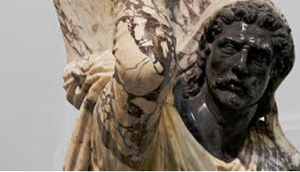Exploitation and Otherness: Investigating the Nexus of Race, Ethnicity, and Enslavement in the Ancient Mediterranean
SUMMER SCHOOL 4-6 SEPTEMBER 2024 - Extended to June 30th (10.00 pm) -

CALL FOR APPLICATIONS TO THE POSTGRADUATE
THE APPLICATION DEADLINE IS
JUNE 23, 2024
10.00 PM (Italian/CET time)
- Extended to June 30th (10.00 pm) -
The 2024 competition notice and the application form are available at www.fondazione1563.it
TURIN HUMANITIES PROGRAMME
CALL FOR APPLICATIONS TO THE POSTGRADUATE SUMMER SCHOOL
Exploitation and Otherness: Investigating the Nexus of Race, Ethnicity, and Enslavement in the Ancient Mediterranean
4-6 SEPTEMBER 2024
INTRODUCTION
Fondazione 1563 per l’Arte e la Cultura della Compagnia di San Paolo (hereinafter ‘Fondazione 1563’) has since 2013 supported research and advanced training in the field of the humanities. In a wider effort to pursue this goal, in 2020 Fondazione 1563 launched the Turin Humanities Programme, a research initiative that allows junior scholars to work on interrelated research projects under the guidance of especially appointed Senior Fellows. THP aims at promoting two-year research projects about relevant global history topics. Under THP Fondazione 1563 launched a third research cycle (2023-25) on Slavery, ethnicity and race in the Mediterranean: ideas and attitudes from Homer to Columbus.
SUMMER SCHOOL 2024 AND ADMISSION REQUIREMENTS
The Turin Humanities Programme and Fondazione1563 are pleased to invite doctoral students and early career researchers to submit their applications to the Summer School Exploitation and Otherness: Investigating the Nexus of Race, Ethnicity, and Enslavement in the Ancient Mediterranean.
The Summer School aims to discuss the role of notions and constructions of otherness for the practice of human exploitation, focusing on the cultures of the ancient Mediterranean. The relation between racism and enslavement is famously debated in the study of modern systems of slavery. In his fundamental (and long overlooked) study of the economics of modern slavery, Eric Williams argued that racial discrimination was more a result than a presupposition of slavery. This thesis is still a focus of controversy for modern historians. Meanwhile, the scholarly consensus, recently restated by Stanley Engerman, holds that ancient systems of enslavement were race-blind, as it were, that is, that they were underpinned by a fundamental notion of the arbitrariness of enslavement, whereby no specific class of individuals was seen as especially prone or likely to be enslaved. The research cycle of the Turin Humanities Programme seeks to challenge this consensus, pointing to the gap between the theoretical arbitrariness of enslavement and the practice of enslaving individuals of specific ethnic groups. In the framework of this revision of ancient ideologies of enslavement, in the 2024 Summer School invites junior and senior scholars to join a discussion on the nexus of otherness and human exploitation in the ancient Mediterranean. While the importance and the very existence of racial and ethnic discrimination in antiquity have been debated and more often than not denied in scholarship after the Second World War, in recent years many scholars have advanced a revisionist line of interpretation, which postulates the existence of racial discrimination and/or racism long before the so-called scientific racism that emerged in the sixteenth or seventeenth centuries. Without necessarily accepting wholesale the consensus that is emerging in this new wave of scholarship, the question that the 2024 Summer School intends to explore is to what extent the human exploitation that was fundamental to ancient Mediterranean economies, typically in the form of enslavement, was supported by or itself generated or promoted ethnic and racial discrimination, and more broadly, an image of the exploited individual as other, culturally or naturally, in comparison to the ancient observer. In this framework, we also hope to explore how and to what extent gender played a role in such notions of otherness. The THP 2024 Summer School provides a forum for postgraduate students and early career researchers in the field of humanities and the social sciences (history, philosophy, literature, art history, anthropology, religion) to engage with the most up-to-date academic debates and global historiographical currents on enslavement, ethnicity and race in the ancient Mediterranean.
We encourage applications from researchers with a strong interest in:
- Slavery and other forms of un-freedom in the pre-modern Mediterranean
- Ethnicity and ethnic prejudice
- Gender in ancient Mediterranean cultures
- Cultural hierarchies and their ideological underpinnings
- Buying, selling and trafficking persons in the ancient Mediterranean
English will be the default language of the Summer School. The Summer School programme includes keynote lectures by Christopher Eyre (University of Liverpool), Daniela Marchiandi (Università di Torino), Christopher Marshall (UBC), Christopher Parmenter (Ohio State University), Amy Richlin (UCLA) and Kelly Wrenhaven (Cleveland State University), research presentations by the Junior Fellows of the Turin Humanities Programme, feedback sessions and roundtable discussions.
To foster dialogue between senior and young scholars, the 2024 Summer School offers its participants a unique opportunity to contribute to the broader discussion on themes of ancient social and cultural history with their own ideas and research. Successful applicants will also have the chance to present their papers in panel sessions which will be followed by a Q&A led by a panel discussant.





